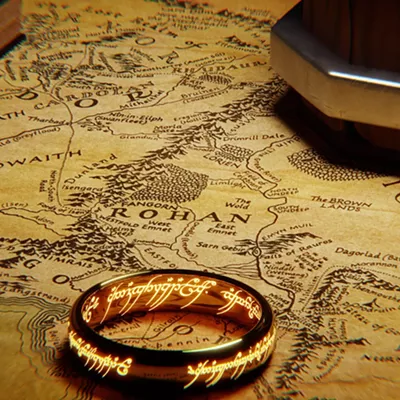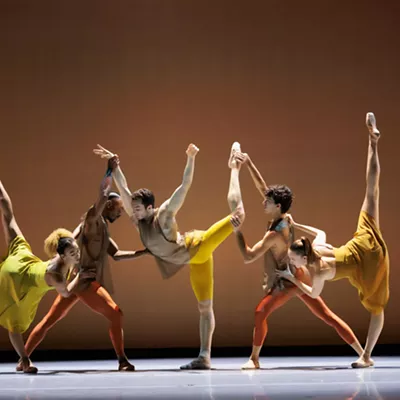Led by Troy Nickerson’s masterful performance as Lennie, Interplayers is presenting a very good production of John Steinbeck’s American classic, Of Mice and Men (through June 24).
Two ranch hands, nearly destitute, one small and one large: The tight-knit duo of George and Lennie typify an admirable kind of mutual dependence. As simple characters with simple desires, they’re just searching for a better life. But throw in some misunderstandings and cruelty, and Steinbeck’s well-constructed play begins its death spiral into visceral tragedy. Done right, with all its anguish and injustice, Of Mice and Men should hit us right in the gut.
Wes Deitrick’s production lands most of its punches. He directs simply and forcefully. For example, in the first storytelling scene — like a child, Lennie loves to hear George tell, over and over, about the idyllic farm they one day hope to own — Deitrick lets his actors emphasize the boyishness without dwelling on sentiment. He’s careful to make moments of physical (and emotional) closeness pay off.
Similarly, Deitrick’s blocking gently emphasizes the characters’ racism and, at times, mutual animosity without italicizing his message. (Steinbeck’s busy enough with all his symbolic animals and foreshadowings.) Who sits where in the black man’s room, for example, holds fleeting importance — and then Deitrick simply moves on.
Perhaps encouraged by audiences that prefer their tragedies leavened with a little humor, Nickerson plays up the retarded giant’s goofiness at times, almost in music-hall style. But Nickerson’s Lennie is child-like and thoroughly likeable onstage. He copies his buddy’s body language early on to let us know that while there isn’t a single original thought rattling around in his noggin, his affection for George is unfeigned and pure. When he listens to George tell all about those chickens and horses and rabbits, Nickerson lies prone, his head in the crook of his elbow, cuddling up with his knapsack, his big rump practically wiggling with glee. He’s a human puppy dog, and it’s clear from then on why Lennie has such a connection to soft little animals, to anything tender — like the dreams and little kindnesses that metastasize into tragedy for him.
George Green plays Lennie’s protector in this buddy-drama. Green (who is The Inlander’s marketing and promotions manager) does many things well in this role: amusement over Lennie’s childishness; resentment at having such a bonehead to look after; boyish enthusiasm when it seems that the dream just might come through; anguish in the final catastrophe.
But Green’s performance sometimes feels strung-together. In the opening scene, for example, his resentment at Lennie suddenly explodes. The two hobos are trading stories when — bam! —George starts pounding on Lennie’s chest, angry not only about Lennie’s irresponsible stupidity in the last town, but about how George stupidly has to be responsible for Lennie now and in the next town and forever. Because George keeps his anger and affection bottled up, it’s more likely to detonate — but traces of his protectiveness, worry and weakness are still going to be lying around in evidence.
Nevertheless, this pair works well together. It’s a stirring moment when Green stands behind Nickerson, with George squeezing Lennie’s shoulders, both of them smiling broadly and staring out at their shared vision of an unattainable future. Green and Nickerson each create some of the finest acting moments this season: Lennie’s childlike joy, George’s conflicted resentment and affection for his buddy, Lennie’s anguish over having done nothing wrong at all. And Green’s agony in the final scene, juxtaposed with Nickerson’s enraptured unawareness, was heart-breaking.
Their supporting cast, however, is uneven: A couple of the ranch hands aren’t menacing, and a couple others rush through speeches without conveying their emotional impact. As Slim, however, Patrick McHenry-Kroetch wears some commanding boots. In his lanky, measured performance, you can feel the aches deep in Slim’s joints, the grime in his sweat.
Early on, Chasity Kohlman’s lonely wife doesn’t sizzle enough with sex-longing, though her final speech, joining the chorus of Steinbeck characters who are willing to break away and make a better life, has conviction. As Candy, the washed-up ranch hand, Gary Pierce is better at conveying enthusiasm for the dream farm than sadness over a pathetic personal loss.
Dan Heggem’s lighting scheme, meanwhile, ignites an intriguing campfire onstage; costumers Janna Cresswell and Peggy Soden contribute sweat-drenched shirts so filthy that we know this isn’t any dude ranch.
Of Mice and Men may underline its symbols and themes, but it’s a story of such basic humanity that it still has visceral impact. This Interplayers production, clearly the best of the theater’s troubled second half of the season, takes more risks than any other Interplayers show all year.
After all, Lennie wanting to hear about his rabbits is the child inside all of us, yearning for happiness. So tell us about the rabbits, George — because we all want to hear about our dreams, even when we know we won’t get them, even when we know the gunshot is coming. During the final scene, it’s not just George and Lennie we’re crying for.

















